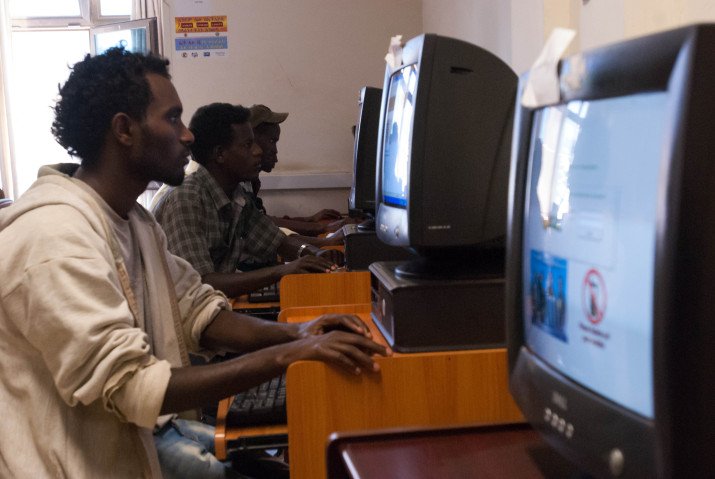An Ethiopian internet cafe. Creative commons image via UNICEF
When things get a little too hot for the powers that be, a sure fire way to cool them down is a good old-fashioned social media blackout. Just ask Congo-Brazzaville, where back in October, a constitutional referendum changed the game, striking down the previous two term presidential limit, allowing 72 year-old President Denis Sassou Nguesso to run for office, yet again. Nguesso was president from 1979 to 1992, returning to his throne in 1997. Nguesso recently won yet again with a supposed 60 percent of the vote. Five more years.
The opposition in Congo-Brazzaville was not happy, crying foul amid allegations of widespread fraud and voter intimidation. A media blackout was instituted with access to social media and SMS blocked. Users were able to circumvent the ban by utilizing virtual private networks or VPNs. General Jean-Marie Mokoko, speaking to VOA’s French to Africa Service said, “When a dictatorship is installed in a country, we (call on) people, basically, to engage in legal civil disobedience to block this attempt at fraud”. Read here for more on the situation there.
In Uganda, Donald Trump doppelgänger, sort of, Yoweri Museveni, won (stole) his fifth term as President this past February. Fraud, voting irregularities, voter intimidation, and the arrest of the opposition have been reported. The state also instituted a media blackout of social media, citing security concerns. Museveni has been President since 1986. Trump has taken note.
Ethiopia, land of coffee and soon to be not land of Emails has drafted legislation that will criminalize spamming. Those found guilty will be subject to five years behind bars in Ethiopia’s state of the art prison facilities where prisoners are treated very humanely, no torture is going on there, just lots of shiro-wat and chill.
Entitled ‘Computer Crime Proclamation’ the legislation targets the mass distribution of mail that aims to sell and/or advertise goods and services and the sharing of photos and content.
A portion of the law reads, “Whosoever intentionally intimidates or threatens another person or his family with serious danger or injury by disseminating any writing, video, audio or any other image through a computer system shall be punishable, with simple imprisonment not exceeding three years or in a serious cases with rigorous imprisonment not exceeding five years.”
In addition to common sense legislation such as criminalizing the dissemination of child pornography, theft, and cyber attacks there is a clause concerning the distribution of material that incites a public disturbance aka protest that is raising some eyebrows.
Some view the new legislation to be a backhanded way of arresting journalists, bloggers, and people who utilize the web to express their opposition to government policies or just factually report news that can be seen as damaging to the Ethiopian government. The new law comes on the heels of a large protest movement that has gripped the nation.
The protests began when development plans to expand the borders of the country’s capital Addis Ababa into Oromia was announced.
Government forces have already wounded, tortured, arrested and killed hundred of protesters. People in parts of the Oromia region have reported messaging applications including Twitter, WhatsApp, and Facebook Messenger as being inactive on the country’s state owned telecommunications monopoly.
Back in March, Tanzanian civil servants were barred from using social media during working hours amid its rise in popularity and have been warned that ‘gossiping’ will lead to termination.
Social media blackouts are far from a distinctly African political feature. In 2011 the Bay Area Rapid Transit system, a public transportation train system in northern California shut down cell phone service in four stations for a few hours following anti-police brutality protests. And then there is China.
Protests in both Zimbabwe and Gambia occurred earlier this month. In Serekunda people went to the streets demanding electoral reform. Meanwhile demonstrators in Harare protested President Mugabe’s four hundred and eighteen year rule. A social media blackout can be expected in the country.

























